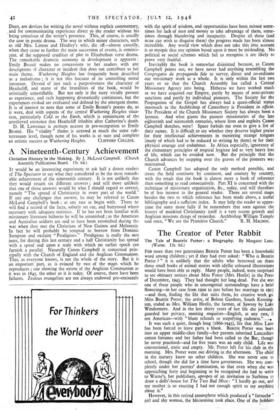A Nineteenth-Century Achievement
IT would be an interesting experiment to ask half a dozen readers of The Spectator to say what they considered to be the most remark- able achievement of the nineteenth century. It is not unlikely that they would return six different answers ; and still more unlikely that one of those answers would be what I should regard as correct, namely " The spread of Christianity in every part of the world." If any one challenges that answer, he may be referred to Canon McLeod Campbell's book ; at any rate to begin with. There he will find a record of the facts, soberly set out, and buttressed where necessary with adequate statistics. If he has not been familiar with missionary literature hitherto he will be astonished ; as the American and Australian soldiers are said to have been astonished during the war when they met the Christians of New Guinea and Melanesia. In fact he will probably be tempted to borrow from Dominic Sampson and exclaim " Prodigious." Prodigious is really the mot juste, for during this last century and a half Christianity has spread with a speed and upon a scale with which no earlier epoch can furnish a parallel. Naturally Canon Campbell is concerned prin- cipally with the Church of England and the Anglican Communion. That, as everyone knows, is not the whole of the story. But it is an important part, as is evinced by two of the maps which he reproduces ; one showing the extent of the Anglican Communion as it was in 1845, the other as it is today. Of course, there have been failures. Zealous evangelists are not always endowed pre-eminently with the spirit of wisdom, and opportunities have been missed some- times for lack of men and money to take advantage of them, some- times through blundering and incapacity. Despite all these (and ncne can wish to disguise them) the progress made has been almost incredible. Any world view which does not take this into account is so myopic that any opinion based upon it must be misleading. No political or social schemes which fail to recognise it are likely to prove very fruitful. Inevitably the book is somewhat disjointed because, as Canon Campbell points out, we have never had anything resembling the Congregatio de propaganda fide to survey, direct and co-ordinate our missionary work as a whole. It is only within the last two years or so that the Church Assembly has called a Central Missionary Agency into being. Hitherto we have worked much as we have acquired our Empire, partly by means of semi-private sanctions and partly by individual pioneers. The Society for the Propagation of the Gospel has always had a quasi-official status inasmuch as the Archbishop of Canterbury is President in officio. The President of the Church Missionary Society has always been a layman. And what giants-the pioneer missionaries of the late eighteenth and nineteenth centuries, whose lives and exploits Canon Campbell sketches, were! Space forbids me even to give a list of their names. It is difficult to say whether they deserve higher praise .for their intellectual achievements in mastering strange tongues (many of which had to be reduced to writing by them) or for their physical courage and endurance. In Africa especially,- ignorance of the elementary principles of tropical hygiene led to very heavy loss of life, which can be avoided now. But the principle that the Church advances by stepping over the graves of the pioneers was maintained.
Canon Campbell has adopted the only method possible, and treats the field continent by continent, and country by country, with the result that the book is almost more a book of reference than something to read consecutively. Part XI is concerned with the technique of missionary organisation, &c., today, and will therefore be of less interest to the general reader. There are several maps besides the two to which reference has been made above, a useful bibliography and a sufficient index. It may help the reader to appre- ciate the story more fully if he remembers that seen against the history of mankind Christianity itself is a very recent growth and Anglican missions things of yesterday. Archbishop William Temple
said once, " We are the Primitive Church." R. H. MALDON.






























 Previous page
Previous page